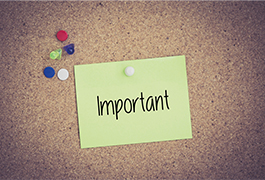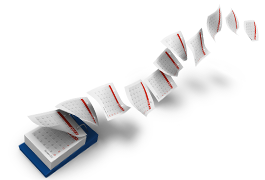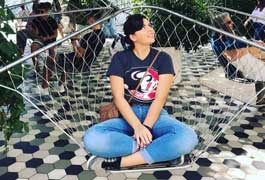How to Choose the Right Lab: Advice from Someone Who Didn’t
By Deanna Montgomery, for Graduate & Postdoctoral Chemist Magazine

One of the biggest stresses in the life of many first-year chemistry graduate students is choosing a lab. Although many factors go into completing a successful PhD program, this early choice is one of the biggest ones. Whether it’s before you begin your graduate program, after completing several research rotations, or through any other mechanism, choosing a lab in which to complete your PhD is no small task.
This decision will have a huge impact on the projects you work on, the places you spend your time, and the people you spend your time with over the next five or more years. In my experience, there is a lot of pressure on graduate students to find the right lab, but there’s not enough easily accessible advice about how to do it.
Perfection Is a Myth
First, I want to dispel the myth of finding a flawless lab. Many people agree that no lab is faultless; however, there is still a lot of talk about choosing the ideal fit. Although it’s important to find an environment in which you can survive and—ideally—thrive, I don’t believe that means looking for the perfect lab, or even the perfect lab for you.
Choosing the right lab is more like developing a close friendship than looking for a soulmate. There are many options that can work for you. A few possibilities will be automatically disqualified because there are, unfortunately, some labs that are inherently problematic. Toxic workplaces do exist. Of course, you want to avoid these environments. Aside from them, as in choosing people to pal around with, it’s important to consider factors that are neither right nor wrong but will still have an impact on your experience.
Midway through my second year of graduate school, I realized I wasn’t in the right environment. The lab I initially thought was a good fit for me—that I had been working in for months—turned out not to be what I needed. Ultimately, my PhD found a happy ending thanks to a fresh start in a different group, but the path to getting there was not a smooth one. Here’s what I wish someone had told me when I was starting out that might have saved me some of the pain I experienced.
Know Yourself
I probably would have rolled my eyes if someone had said this to me while I was trying to figure out which lab to join. But here’s what I mean: To find a lab that will be a good fit, you have to know what you are looking for. What kind of environment will you thrive in? Reflecting on what will suit you in a lab is the first step to finding a group that meets your needs.
Here are some questions to think about:
- Do you have your heart set on doing a particular kind of research? Or are you the kind of person who can get excited about anything if you work on it long enough?
- Do you want a sociable lab? Or do you want some interpersonal distance? In some labs, members go to happy hour together or have game nights. In others, people are friendly but don’t socialize outside of working hours. Which environment suits you better?
- Do you want to work in a big lab, a small one, or something in between?
- Do you prefer to work within a structured schedule or choose your own hours?
- Do you want a lot of guidance from senior lab members and your adviser? Or do you prefer to figure things out on your own?
Reflecting on these and similar questions will help you to figure out which aspects of lab life are most important to you and which are negotiable. There is no single most important factor in choosing a lab in general, but there may be something that is most important to you personally.
Know the Lab
To know whether a lab is a good fit for you, you have to do your research—sometimes literally. Research rotations are a great way to investigate the inner workings of a lab. A rotation affords you the opportunity for a test run; spending time working in a lab that you might want to join is one of the best ways to get a sense of what the lab culture is like.
Be aware, however, that your experiences as a rotation student versus a full-fledged lab member may differ. During a rotation, seek not only to evaluate your own experience but also to get a sense of what the environment is like for senior students and what your experience would be like in the long term.
In some programs, rotations are not an option. If this is the case in your situation, be creative about learning what goes on behind closed doors. Can you arrange a visit to the lab to see what it’s like? Can you shadow a senior student or postdoc for a day, a week, or a month?
Know the People
In any circumstance, one of the best ways to gather information about a lab is to ask people who work there. Even though it’s fine to talk with postdocs, lab technicians, and others, focus your time on people whose experience is likely to be most similar to yours: other graduate students. Talk to both junior and senior graduate students, as they will have different perspectives.
Consider talking to students in more than one lab to get a sense for how things differ from group to group. If you have specific questions or concerns about how you will fit into the lab based on anything from gender to departmental affiliation, try to find someone who can address those topics from personal experience.
When having these conversations, if possible, set up a time away from the lab and other lab members to chat one-to-one. This generally allows for more informal conversation. Try to ask a mixture of open-ended and specific questions.
It’s most useful to generate your own list, but you’ll find some general questions below to get you started:
- What is your biggest complaint about the lab?
- What do you like about the lab?
- Why did you join the lab?
- How has working in this lab lined up with your expectations?
- What has changed between your rotation and formally joining the lab?
Or if there was no rotation, ask:
- What has changed between when you first joined the lab and now?
If I could only ask one question, it would be the first one on this list. No lab environment is perfect. But some negative qualities are things you can live with, while others are not. Everyone has complaints about their work environment, but it’s important to look at the number, size, and nature of those complaints.
Does a specific piece of equipment break down frequently? You can probably live with that. Is the faculty adviser hard to reach for weeks at a time? That might be a problem for you. Be aware that labs often function like families; although there may be dysfunction behind the scenes, current lab members may be hesitant to voice their complaints to someone outside that inner circle. If you feel that you’re not hearing the truth, politely insist that you’d like an honest answer so that you can evaluate whether this lab is the right fit for you.
Know the Adviser
A supportive adviser is another key to success in grad school, but there are many different opinions about what that support should look like. It’s as critical to spend some time reflecting on what you’re looking for in a mentor as it is to think about what you’re looking for in a lab.
Overall lab culture often develops, in part, as a result of a faculty member’s management style. If you have the opportunity to complete a research rotation, you should get a sense of this style during that time. If you don’t, it’s a good idea to ask questions before committing to join a lab.
Here are some questions you may want to ask a potential adviser:
- Do you consider your mentoring style to be hands-on or hands-off?
- How often do you meet with students individually?
- How do you encourage students to find answers to their questions or troubleshoot something that isn’t working?
- How do you assess a student’s progress?
- How do you handle vacation and sick time?
To get the best sense of an adviser’s mentoring style, talk both to the faculty member directly and to the individual’s students, as this will give you the most complete picture.
As with any experience or any relationship, there is no way to guarantee a positive outcome when you choose a lab to join. However, putting time and thought into the decision will significantly increase your odds of finding a lab that is a good fit for you.
ABOUT THE AUTHOR

Deanna Montgomery recently completed her PhD in medicinal chemistry at the University of Michigan, where her work resulted in two first-author publications. She now works full-time with the MIT Communication Lab, encouraging scientists and engineers to improve their technical communication skills.




